WFO’s Strategic Framework
2022-2026
Making 75 Years of contributions to Families in Development
The 5 Main Strategies
The current WFO’s Strategic Framework 2022-2026, aspires to fulfill the World Family Organization’s vision as well as its main objective to represent families of the world at all levels, to defend their interests and to act with them and for them vis a vis with governments at national, subnational and local levels, as well as with the international community.
The main goal of the Strategic Framework 2022-2026, is to continue to ensure that WFO’s message is widely disseminated, leading to enacting family focused public policies that contribute to the sustainable social, economic, environment and cultural development.
Click on each of the 5 Strategies to expand:
One of WFO’s main functions is to promote, in cooperation with specialized agencies where necessary, family-focused public policies and service delivery for improvement of housing, health, sanitation, nutrition, education, recreation, work conditions, welfare systems, social protection and family benefits, family relationships and environmental issues affecting families.
During the implementation of this strategy, WFO’s programs and projects will be strengthened and expanded on the already achieved results of the main four family-focused public policy areas, namely: health, early childhood care and education, housing and social protection.
Since WFO is mandated to contribute to promoting research, studies and exchange of information, this strategy will also address some of the above identified policies by conducting research, discussing findings and policy options with relevant experts and institutions involved and consequently providing publications that will be disseminated to researchers, policy makers and NGOs.
WFO will also target program managers by developing needed guidelines that will assist managers in implementing development projects. In relation to the “Health” thematic area, WFO will continue in establishing hospitals and family health centers at the local level in unprivileged areas and in special Pediatric Hospitals for Cancer and Rare Diseases.
WFO’s work in this strategic cycle will be linked to the landmark agreement that was reached in September 2015 on a universal transformative agenda among UN member states. The Agenda 2030 for Sustainable Development is an agenda that will stimulate action at the International, Regional and National levels over fifteen years in areas of critical importance for humanity and the planet. The vision articulated in the 2030 Agenda will be achieved through the attainment of the 17 Sustainable Development Goals and 169 targets, forming an integrated and indivisible set of goals oriented towards promoting social, economic and environmental dimensions, as well as peaceful and inclusive societies, justice, strong institutions and partnerships.
Governments enact a broad range of family policies and programs relating to different facets of the life of families and individual family members, including couples, parents, children and older persons. Such policies have an often-untapped potential to contribute to the achievement of many national development goals. The design, development, implementation and monitoring of family-oriented policies and programs are essential for the success in achieving several goals of the 2030 Sustainable Development Agenda.
In order to effectively reach families, local governments and communities need to be mobilized since their role is essential for promoting inclusive sustainable development within their areas and communities. By creating broad-based ownership, commitment and accountability, they are vital partners to the implementation of the Sustainable Development Goals (SDGs).
In order to address the issue of large movements of refugees and migrants the UN General Assembly adopted on 19 September 2016 the “New York Declaration for Refugees and Migrants”. The Declaration expresses the political will of world leaders to save lives, protect rights and share responsibility on a global scale. The Declaration contains bold commitments both to address the issues we face now as well as to prepare the world for future challenges.
Recent wars affected several families who were obliged to leave their homes and their countries seeking a safe haven since conflicts impact adversely on the economic and political stability of their home countries. Destruction of infrastructure, erosion of educational opportunities and loss of employment and loss of family income are among the negative consequences of wa
Under war and conflict situations, family members face social, psychological, physical and emotional challenges. The most vulnerable members of the family such as women, children, elderly and the disabled, become more exposed to exploitation and abuse. Children may become exposed to maltreatment and abuse such as becoming child soldiers or girls marrying very young. Youth who participate in conflicts bears heavy implications on their physical and emotional well-being.
Once families are displaced from their home countries they struggle in coping with their new social and economic realities, loss of social capital, and the mechanism of adaptation becomes fundamental. Therefore, WFO is planning to intervene in supporting families and recipient countries to equip both immigrating families and recipient countries with essential information, mechanisms and tools needed to facilitate their coping mechanisms.
WFO believes that partnerships and collaborative relationships are critical to its work, and since its inception in 1947, it has worked with a broad range of partners and stakeholders at international, regional and local levels to promote the well-being of families around the world.
WFO aspires to maintain and strengthen its current partnerships and to establish new ones under the different categories as program implementation entails: UN system, International Financial Institutions, Inter-governmental Institutions, National and Local Governments, NGOs and CSOs and the private sector.
The world of communications and technology has considerably changed in the past decade. WFO’s use of proactive communication methods is vital to this new era. Information need to be produced and conveyed in a timely, attractive and persuasive manner using the appropriate media channels including social media.
Therefore, an update to the way WFO communicates to the world is of utmost importance. A global organization must benefit from the power of online technology.


